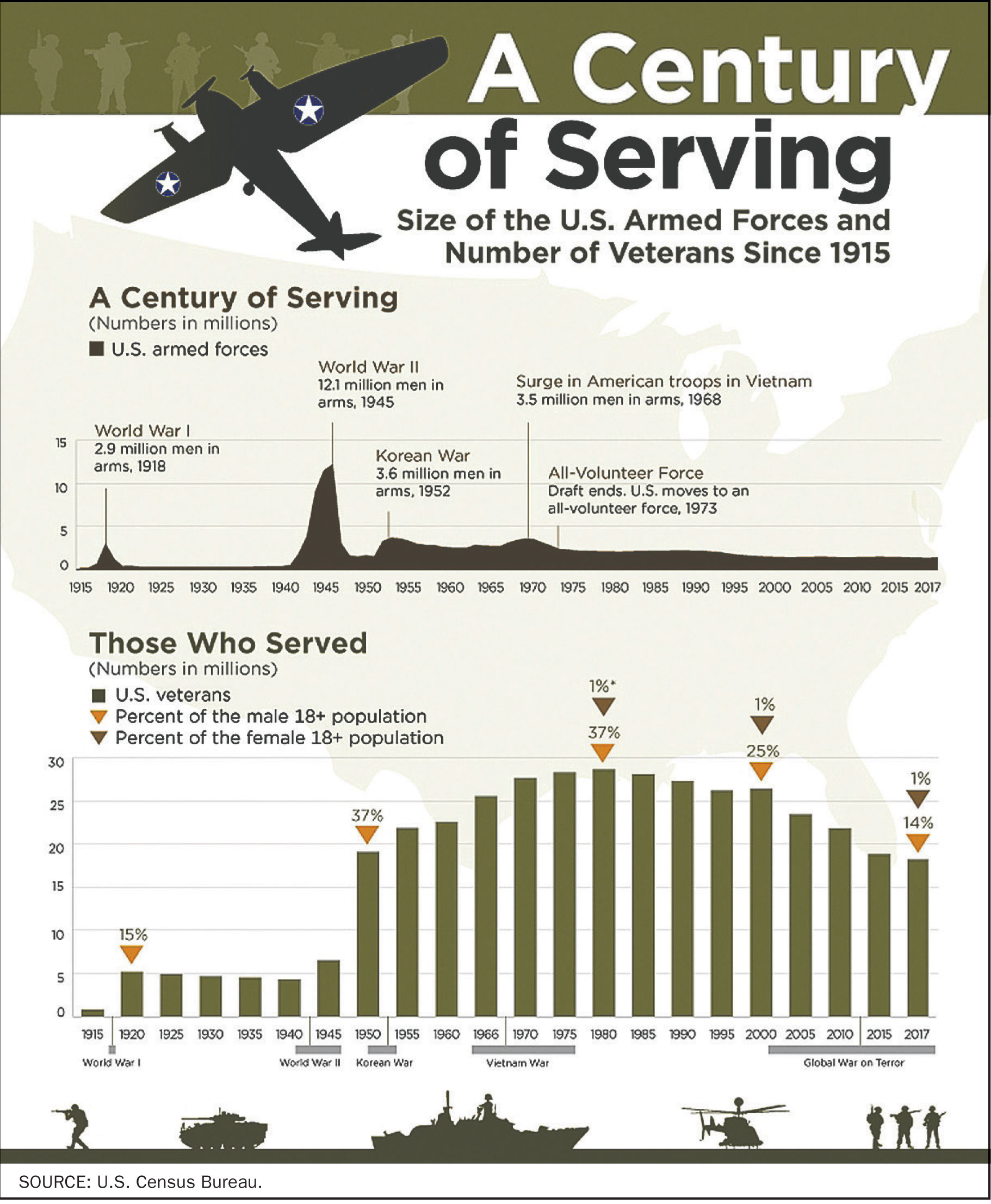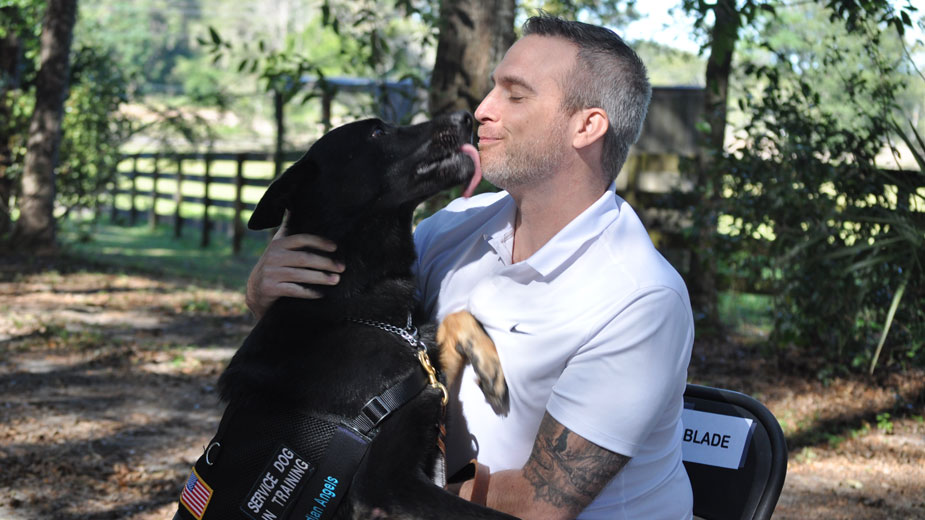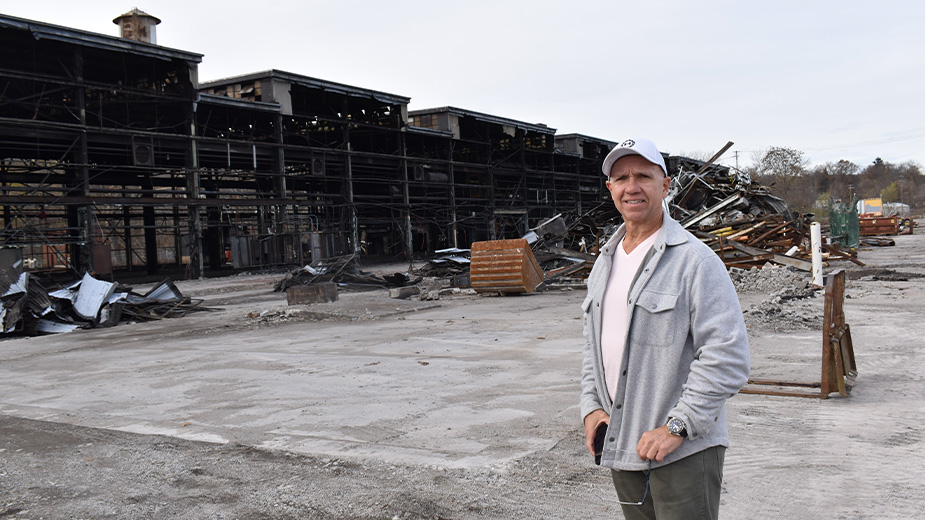Veterans Earn Support from Employers
YOUNGSTOWN, Ohio – During his 23 years with the U.S. Army, Michael Clark saw his share of deployment in Africa, Iraq and Afghanistan. But 2010 was “a pretty rough year,” he says.
He suffered a back injury, had a few friends who didn’t make it home and struggled transitioning from deployment to civilian life.
“I felt like I didn’t know where to turn,” he says.
When he retired from the Army in 2015, the U.S. Department of Veterans Affairs helped him make the transition back to life stateside, but “I wasn’t keen on all the medications they tend to give you,” he says. While searching for a more holistic approach, Clark learned of the benefits of service dogs with issues such as post-traumatic stress disorder, or PTSD.
Clark, an analytics specialist at PNC Bank, learned of its Mutt Strut program that pairs veterans with medical-service dogs. He applied for the program, and in 2017, he met Blade, a German shepherd that has been at his side ever since, even at the office.
“She has been instrumental in making me feel like I have a life again,” Clark says. “These dogs are trained to be alert to different ailments that a lot of vets coming home from combat experience.”
Such ailments include panic attacks, anxiety from being in a public place and migraines, from which Clark suffers. Blade can sense the onset of a migraine two hours before it hits, he says, which gives him time to take medication and find a place to relax.
In the three years the program has been active, PNC has paired service dogs to 30 veterans within the company. Working for an organization that offers such services to its veterans makes it stand out as an employer, Clark says.
“They embrace us. They give us opportunities. They challenge us. And they have so many programs available to help us and bring us back into the workforce,” Clark says.
Providing services to help veterans assimilate into society is important to PNC, says Ryan Pastore, vice president of client and community relations. It also makes good business senses.
“These are great people who probably have the best training in the world and come back to work for PNC,” Pastore says. “So it is an advantage for us to hire this talent and further their careers as they come back to civilian life.”
Organization and time management are two critical characteristics in the banking industry, adds Ted Schmidt, regional president of PNC Bank. And the military starts instilling those traits from Day 1, he says. In 1984, Schmidt joined the Army National Guard where he served six years, so he understands that type of training and how it helps veterans in the civilian workforce, he says.
“They’re building leadership skills,” Schmidt says. “When you’re coming out of the military, you’re not waiting for someone to tell you what to do. You’re prepared to make decisions and lead a team.”
PNC provides mentorship, development and leadership opportunities through its Military Employee Business Resource Group, and offers guidance to veterans with its military advisory council. The bank also has an internship program for veterans. PNC’s efforts have earned recognition from the veterans community, including being named Best of the Best by U.S. Veterans Magazine and receiving the Secretary of Defense Employer Support Freedom Award.
“These programs are very important,” Schmidt says, “not just for our employees. Giving back to the community is a very important goal of ours as well.”
While PTSD is certainly an issue, a returning veteran might have other obstacles to employment, says Kim Adams, veterans legal advocate with Community Legal Aid Services. After nine years with the Air Force, including deployments during Desert Storm and Desert Shield, Adams had difficulty transitioning to civilian life after she retired in 1991.
At the time, there weren’t as many services for returning veterans as now, she says. With Community Legal Aid, Adams works to raise awareness of these programs to returning veterans, as well as those offered by partner organizations.
Primarily, Community Legal Aid provides free legal clinics in Youngstown and Canton to help veterans with issues such as housing and foreclosure, finances, wills, veterans benefits and criminal charges, Adams says.

For qualifying offenses, Community Legal Aid can assist with record sealing or obtaining a Certificate of Qualification for Employment, which is essentially a judge vouching for a veteran’s character.
“That could go a long way with an employer,” Adams says. “It’s up to them whether they hire you, but these things that we do can put a vet in a better position to be able to gain employment.”
In 2018, Community Legal Aid served more than 520 vets with legal issues, she says, “and that number is only going to grow as more people leave the service.” The Census Bureau reported in 2016 that Ohio has the sixth-largest veteran population in the United States at 814,000, more than 100,000 of whom live in the Mahoning Valley, she says.
More businesses are understanding and working with the responsibilities of employees who are actively enlisted, says Troy Rhoades, a 31-year Air Force Reserves veteran and the regional external affairs manager for FirstEnergy Corp.
When Rhoades first came to the company in 1998, he was the command chief master sergeant with the 910th Airlift Wing at the Youngstown Air Reserve Station. He retired from the military in 2014. “It’s amazing what FirstEnergy has done” to accept and support the weekend duties of its veterans workforce, he says.
FirstEnergy employs some 1,200 veterans across six states, a little less than 8% of its total workforce, says Christopher Eck, a spokesman for the company. Supporting its veteran employees benefits the company, he says, because of the self-discipline and transferable skills they bring to the workplace.
When utility linemen get a service call at 7 p.m. on a Sunday or are sent to areas such as Florida and California to deal with the fallout from natural disasters, workers with military experience are “ready to go at a moment’s notice,” Eck says.
“They bring that loyalty and sense of urgency to the call,” he says. “And those families need to be prepared to be away from them at least for a few days. So they are adjusted to those moments.”
Two electrician apprentices with NECA-IBEW are currently on deployment, and their spots are safe with the union, says Jack Morse, business manager, IBEW Local 53. Supporting military personnel who are on active duty is important to Morse, who served as a military-police dog handler with the Air Force from 1977 to 1981.
“Personally, I think it’s fantastic,” Morse says. “You know what’s involved; you know what you went through to finish out your deployment. So you want to take care of them.”
Veterans comprise about 10% of the union workforce, he says. Through the national Helmets to Hardhats nonprofit program, the IBEW actively reaches out to service members nearing the end of their service to “give them a place to head right out of the gate,” he says.
Having a military background “carries a lot of weight” with the IBEW because they’re trained on cutting-edge technology, Morse says.
“Having steady employment is the best aid you can give a veteran,” he says. “It’s one less thing for them to stress and worry about.”
Greg Smith agrees. Veterans have a “fundamental aptitude for leadership” and often ascend to leadership or managerial roles, says the chairman of Compco Industries in Columbiana.
“Veterans have to know the end-game,” Smith says. “They need to know what you want and what victory looks like. That’s how they’re trained.”
To ensure veteran employees are in the best position for success at Compco, the company employs a program to assess each employee’s strengths. While some are more comfortable working directly with customers, others might be numbers people, leaders, or willing to roll up their sleeves to get the work done, Smith says.
“Everybody’s a little different in those areas,” he says. “We put them in situations where they’re the most effective.”
Veterans employed by Compco receive an additional paid day off annually, Smith says. Veterans and first-responders receive a military service coin presented by a fellow veteran. “It’s a big deal for a veteran. To them, that’s more than a coin,” Smith says.
Pictured: Michael Clark, an analyst with PNC, was matched with his service dog, Blade, through the bank’s Mutt Strut program for veterans.
Copyright 2024 The Business Journal, Youngstown, Ohio.



